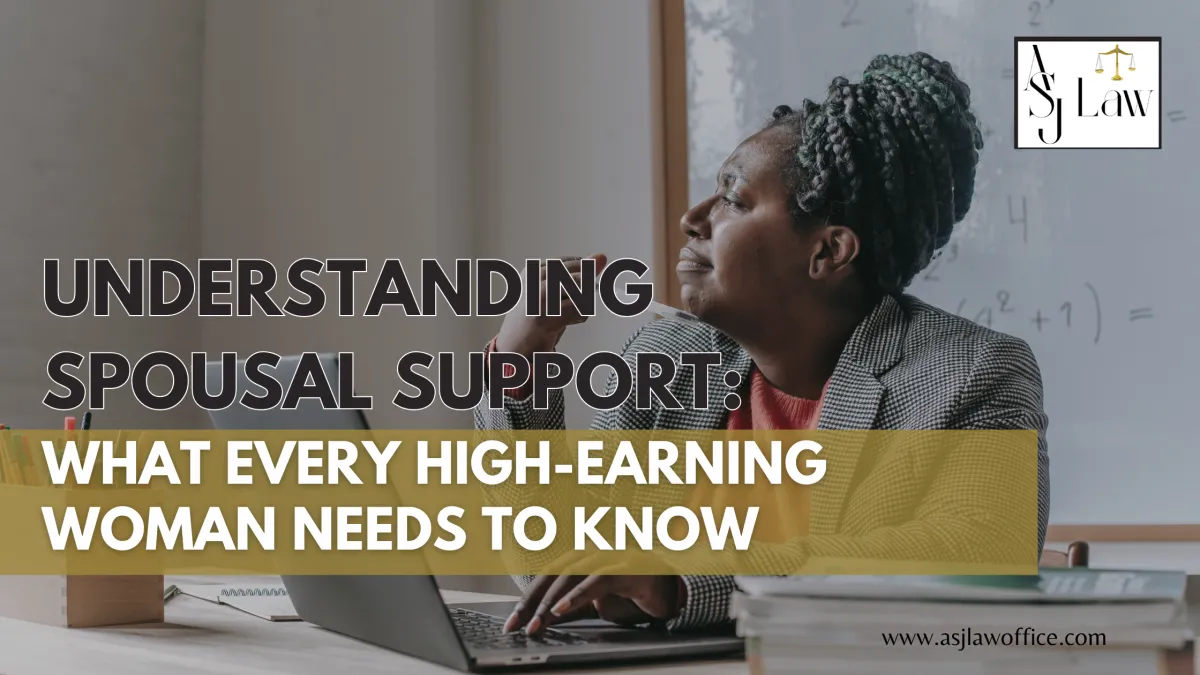
Understanding Spousal Support: What Every High-Earning Woman Needs to Know
Understanding Spousal Support: What Every High-Earning Woman Needs to Know
You Built a Life on Your Terms—Now You're Being Asked to Support His
You didn’t just break ceilings—you built a life with intention. Years of ambition, leadership, and personal sacrifice led you to where you are today. Whether you are a business owner, C-suite executive, or top-performing professional, your financial success is the result of tireless effort. So when divorce becomes part of your narrative, the idea of paying spousal support—often called alimony—can feel like an unexpected reversal.
Many women in your position share the same reaction: How is it fair that you’re being asked to fund your ex-spouse’s next chapter?

The truth is, spousal support in New York isn’t always about fairness as you define it—it’s about maintaining a balance the law believes is reasonable. But understanding how that balance is calculated, what influences the court’s decisions, and how you can protect your financial future puts the power back in your hands.
What Is Spousal Support in New York?
Spousal support is a financial payment one spouse may be required to make to the other during or after a divorce. In New York, it's based on both statutory guidelines and judicial discretion. While formulas exist to suggest an amount, the final decision considers a range of personal and financial factors. For high-income earners, the outcomes can be significant—especially when there's a notable disparity in income or earning potential between spouses.
The court's goal is not to punish success but to ensure that both parties can transition out of the marriage without undue financial hardship.
How Spousal Support Is Calculated in New York
New York uses a spousal support calculator as a starting point, but it's not the full picture. The court may depart from the guideline amount if it determines that the formula doesn’t reflect the realities of your situation. For high-earning women, this flexibility can work for or against you, depending on how well your legal team presents your case.
Key factors the court will consider include:
The income of both spouses: This includes base salary, bonuses, commissions, investments, and other forms of compensation. If you’re the primary or sole earner, that will weigh heavily.
Length of the marriage: Longer marriages often result in longer support durations. A 15-year marriage will be treated differently than a 5-year one.
The standard of living during the marriage: Courts often aim to allow both parties to maintain a lifestyle that’s as close as possible to what they had during the marriage.
Each spouse’s earning capacity: If your former partner has limited work history or education, the court may provide them time to become self-sufficient, which could mean you cover more support temporarily.
Contributions to the household: Even if your spouse didn’t earn an income, contributions as a stay-at-home parent or supporter of your career are relevant and weighed by the court.
Age and health of each spouse: Health concerns and nearing retirement can both influence the duration and amount of support awarded.
Types of Spousal Support You May Encounter
There isn’t a one-size-fits-all spousal support order. New York courts can impose different types of maintenance depending on your circumstances.
Temporary Maintenance: Paid while the divorce is pending. Its purpose is to ensure both spouses can cover their expenses during the transition.
Post-Divorce Maintenance: This may be for a set period or longer term. It’s often meant to give the lower-earning spouse time to regain financial independence.
Durational vs. Non-Durational Maintenance: Durational support is set for a limited period, often tied to the length of the marriage. Non-durational support—though less common—is open-ended and may be awarded in long marriages where the other spouse is unlikely to become self-supporting.
What Makes This Complex for High-Earning Women
As a woman who leads in your profession or runs your own business, your financial footprint is complex. Your income may fluctuate year to year. You may hold equity in your company, deferred compensation, or future bonuses that are challenging to quantify during settlement discussions. These realities are often misunderstood or oversimplified if not properly explained to the court.
Moreover, there’s often a deep emotional component: The social assumption that men pay support dies hard, and the stigma around high-achieving women "funding" their former partner's lifestyle can feel especially sharp.
This is not about bitterness or resentment. It’s about ensuring that your contributions—to your marriage and your professional life—are seen clearly and treated fairly.
Strategies to Protect Your Financial Future
You don’t have to resign yourself to a spousal support arrangement that feels punitive. There are legal strategies and planning tools available to minimize your exposure and support a fair outcome.
1. Use Your Financial Records to Your Advantage
Detailed records of your income structure, business holdings, and expenses can provide context that a court might otherwise overlook. It also helps combat assumptions based solely on gross income.
2. Highlight Your Spouse’s Earning Capacity
If your spouse is capable of working or returning to school, that should be emphasized. Courts are less inclined to award long-term support when the recipient has viable options for self-sufficiency.
3. Negotiate Creatively During Settlement
Spousal support doesn’t always have to be monthly checks. Some high-earning women negotiate lump-sum payouts or offset spousal support with more favorable asset division terms.
4. Consider the Role of Mediation
Mediation provides more control over the final terms. It allows for privacy, flexibility, and custom-tailored agreements that reflect your unique financial landscape—something a judge may not fully appreciate in court.
5. Monitor for Modifications
Support orders are not always permanent. If your ex remarries, becomes employed, or experiences a significant financial change, you may be eligible to modify or terminate the agreement.
You Deserve a Strategy as Sophisticated as You Are
Navigating divorce and spousal support is not just a legal issue—it’s a financial and emotional decision that deserves the same care and precision you bring to your career. You’ve spent years building success, often in spaces where few women have led before. You shouldn’t have to dismantle that foundation in the name of “equality” during divorce.
The law may be neutral on paper, but how it’s applied depends on how well your story is told—and how skillfully your legal team negotiates.
We work with high-achieving women who want to protect what they’ve built while handling their divorce with dignity and clarity. If that sounds like you, we’re ready to help.


